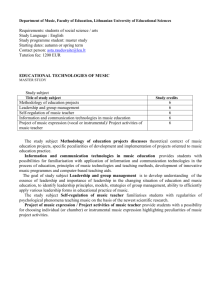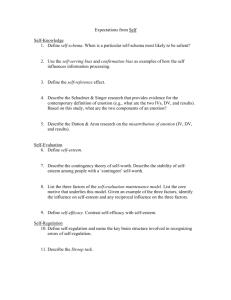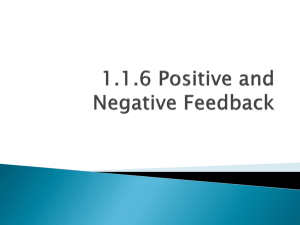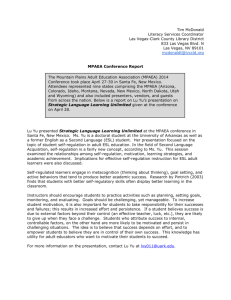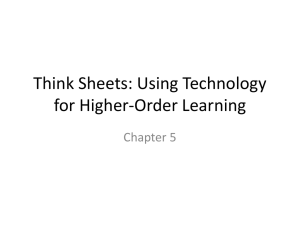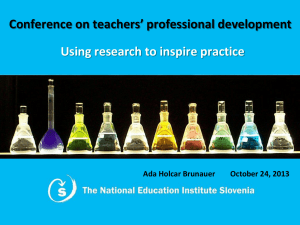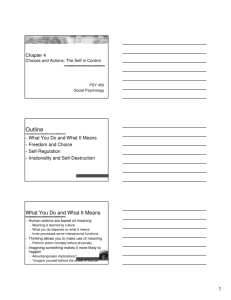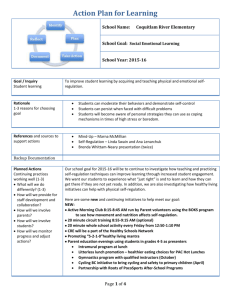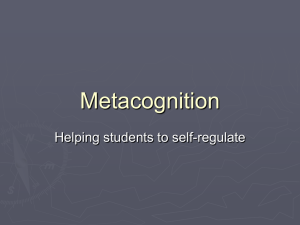Self-Regulation-Slides - Students at the Center Hub
advertisement
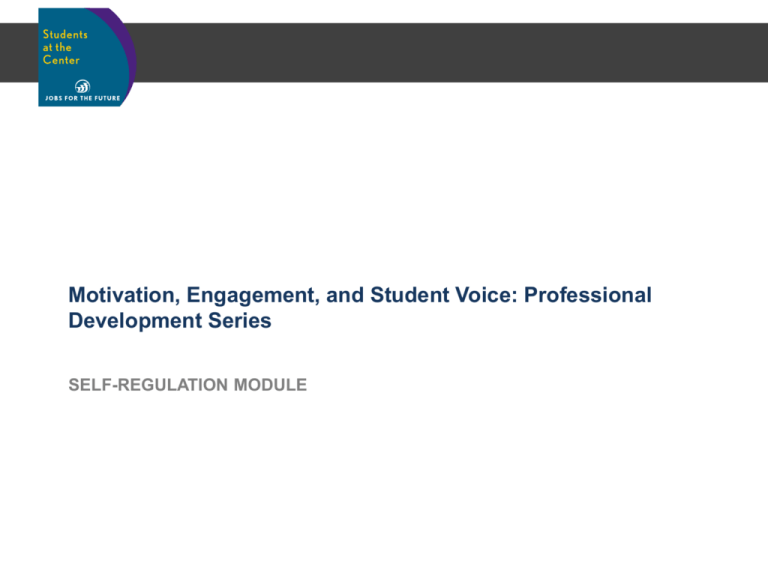
Motivation, Engagement, and Student Voice: Professional Development Series SELF-REGULATION MODULE LESSON 1 Fusing Skill and Will “In the process of decoding, [students] externalize their thematics and thereby make explicit their ‘real consciousness’ of the world. As they do this, they begin to see how they themselves acted while actually experiencing the situation they are not analyzing, and thus reach a ‘perception of their previous perception.’ By achieving this awareness, they come to perceive reality differently; by broadening the horizon of their perception, they discover more easily in their ‘background awareness’ the dialectical relations between the two dimensions of reality. By stimulating ‘perception of the previous perception’ and ‘knowledge of the previous knowledge,’ decoding stimulates the appearance of a new perception and the development of new knowledge. The new perception and knowledge are systematically continued with the inauguration of the educational plan, which transforms the untested feasibility into testing action, as potential consciousness supersedes real consciousness.” — Paolo Freire • What did you notice in yourself? • What did you do to remain focused while reading? What strategies did you employ? • If you were unsuccessful at remaining focused, why? What did you do and not do? • What did I do as your instructor? How successful were my strategies? Did my actions help you to initiate and sustain focus? SELF-REGULATION • Self-regulation is the planning, goal-setting, organizing, selfmonitoring, and self-evaluating all learners do in the process of building new knowledge. • It is a skill-set that is learned incrementally over time, developing only when contexts support it. • It is often misread and misunderstood by even the best educators. SELF-REGULATION: CYCLICAL PROCESS • • • • Self-evaluation Attribution Self-reactions Adaptivity SelfReflection Forethought • Goal setting • Strategic planning • Self-efficacy beliefs • Intrinsic interest Performance Control • Attention focusing • Self-instruction • Self-monitoring • Help requesting Zimmerman, B. J. (1990). Self-regulated learning and academic achievement: An overview. Educational Psychologist, 25(1), 3-17. SELF-REGULATION Forethought nonspecific distant goals, performance goal orientation, low self-efficacy, disinterested specific sequenced goals, learning goal orientation, high selfefficacy, intrinsically interested Performance Control unfocused plan, selfhandicapping strategies, outcome self-monitoring focused on performance, selfinstruction/imagery, process selfmonitoring SelfReflection avoid self-evalua-tion, ability attributions, negative selfreactions, nonadaptive seek self-evaluation, strategy/effort attributions, positive self-reactions, adaptive Zimmerman, B. J. (1990). Self-regulated learning and academic achievement: An overview. Educational Psychologist, 25(1), 3-17. (MIS)READING SELF-REGULATION • “I just do what my teacher tells me.” • “If I’m having difficulty motivating myself to complete my homework, I just work harder.” • “I can multitask and still do fine.” • “I don’t feel like it.” • “This is stupid.” • “I don’t understand.” • “F--- you!” LESSON 2 Misbehavior May be Misunderstood and Mislabeled Misbehavior May be Misunderstood and Mislabeled - Opening Prompt “Sarah is a vivacious, enthusiastic and socially-connected 9th grade student. Sarah frequently arrives to class five or six minutes tardy. At this point, most of the class is engaged in the first activity of the period. After she arrives, she checks in with her friends , and sometimes tours the classroom. She usually needs to obtain a writing utensil and other necessary supplies from another member of the class or the teacher. Her grades were in the high 80s in the first semester, but have fallen to the low 70s by the middle of the year. She says she is not interested in the class and frequently distracts her classmates with off-task behaviors during lesson activities.” Self-Regulation Definition 1. Self-regulation is the planning, go al-setting, organizing, selfmonitoring, and self-evaluating all learners do in the process of building new knowledge 2. It is a skill-set that is learned incrementally over time, developing only when contexts support it 3. It is often misread and misunderstood by even the best educators APPLYING SELF-REGULATION THEORY 1. How might self-regulation theory apply to Sarah’s actions? 2. When might a lack of self-regulation lead to "misbehavior"? 3. If you were Sarah’s teacher, what might you do to support the development of more sophisticated self-regulation strategies for Sarah and her classmates? LESSON 3 In a Distracting World, Self-Regulation to the Rescue Opening Prompt • What will be most useful for your support of self-regulation strategies in class starting this week? What tool or resource could support this work? CONCLUDING DISCUSSION • Why might specific students have underdeveloped self-regulation skill sets that hinder their ability to focus and sustain effort? • What strategies have been suggested to support development of self-regulation? • How will we concretely apply our new understanding of selfregulation theory to these particular learners? What scaffolding and tools would help them?
